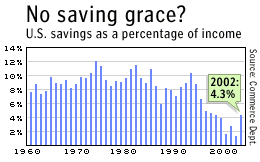NEW YORK (CNN/Money) -
When Wall Streeters look at the money getting built up in U.S. money-market accounts they start salivating like Pavlov himself was ringing a bell. But the meal they're expecting may be an awfully long time coming.
It is a big wad of cash, no doubt. Since the bear market began Americans have steadily redirected their dough away from the stock market into the money markets. In March 2000, according to the Investment Company Institute, there were $4.44 trillion in stock market mutual funds and $1.7 trillion in money market funds. By the end of last November, stock fund assets had fallen, thanks to the market decline and outflows, by 36 percent to $2.82 trillion while money market fund assets were up 36 percent to $2.3 trillion.
"There's clearly a lot of money that either was in stocks or could be in stocks," said Salomon Smith Barney strategist John Manley. "It's just sitting out there now."

It's just sitting out there and it isn't doing very much for investors. Thanks to the Fed's steady cutting, the annual rate of return on the average money-market fund has gone from 5.3 percent to 0.8 percent since the stock market topped out.
Yes, that's still a much sweeter return than stocks have offered, but 0.8 percent ain't exactly what retirement dreams are made of. Given stocks' history of offering investors long-run returns approaching 10 percent annually, it would make sense for a good sized chunk of that cash in money markets to make its way back into the stock market -- say, for instance, once Iraq is no longer weighing heavy on investors' minds. How else are we going to be able to afford that condo near the Epcot Center?
Well, let's think about that for a minute. What was the name of that thing that people used to do when they wanted to have money for the future, before the go-go 1990s made them think that hefty stock returns would take care of every little thing? Oh, that's right -- saving.
A return to that archaic habit seems more likely than a newfound love for equities, thinks Merrill Lynch chief strategist Rich Bernstein.
For one thing, he points out, it's not like Americans don't have a huge hunk of cash in stocks already. Back in 1990, around 21 percent of U.S. households' financial assets were in stocks, according to the Federal Reserve. Now, even after three years of bear market conditions, it looks like about 30 percent.
"There's an assumption that people have abandoned equities," said Bernstein, "and it's just not true."
Bernstein thinks U.S. investors will become increasingly conservative as the years roll by. While some, having seen their savings slammed by the bear market, will put outsized bets on the stock market, most will play it safe. The leading edge of the baby boom is 57 years old now, and retirement, or at least the hope of being able to retire someday, looms.
The other recent example of an aging population that's been shellacked by the equity market suggests that investor conservatism could be the rule for years to come. In 1990, the year the Tokyo stock market bubble burst, a Japanese postal savings certificate returned around 6.3 percent. Now it gives out a 0.07 percent return.
And the response of Japanese households to such low returns? Their savings rate rose from 12 percent in 1989 to touch 15.4 percent in 1998 and now sits at 13.5 percent. And this happened despite rising unemployment, which usually eats into a nation's savings rate.
Although it rose over the past year, the U.S. savings rate is still much lower than Japan's ever was. At the end of 2002 it stood at 4.3 percent compared with 8.2 percent at the end of 1990. Maybe it won't get back to the 8 percent-or-so it averaged before the boom years, but it sure seems like it could be heading higher, thinks Dresdner Kleinwort Benson global investment strategist James Montier.
"People are just going to have to put more and more of their money away," he said.
That, in turn, he thinks could lead to a shift to lower growth in consumer spending, which would mean a slower growing economy, and, in turn, lower investment returns. Which would -- you guessed it -- give investors even more reason to save their money rather than put it in stocks.

|

